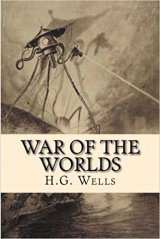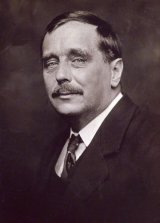The War of the Worlds Page #6
The War of the Worlds is a science fiction novel by English author H. G. Wells first serialised in 1897 by Pearson's Magazine in the UK and by Cosmopolitan magazine in the US.
This was the Deputation. There had been a hasty consultation, and since the Martians were evidently, in spite of their repulsive forms, intelligent creatures, it had been resolved to show them, by approaching them with signals, that we too were intelligent. Flutter, flutter, went the flag, first to the right, then to the left. It was too far for me to recognise anyone there, but afterwards I learned that Ogilvy, Stent, and Henderson were with others in this attempt at communication. This little group had in its advance dragged inward, so to speak, the circumference of the now almost complete circle of people, and a number of dim black figures followed it at discreet distances. Suddenly there was a flash of light, and a quantity of luminous greenish smoke came out of the pit in three distinct puffs, which drove up, one after the other, straight into the still air. This smoke (or flame, perhaps, would be the better word for it) was so bright that the deep blue sky overhead and the hazy stretches of brown common towards Chertsey, set with black pine trees, seemed to darken abruptly as these puffs arose, and to remain the darker after their dispersal. At the same time a faint hissing sound became audible. Beyond the pit stood the little wedge of people with the white flag at its apex, arrested by these phenomena, a little knot of small vertical black shapes upon the black ground. As the green smoke arose, their faces flashed out pallid green, and faded again as it vanished. Then slowly the hissing passed into a humming, into a long, loud, droning noise. Slowly a humped shape rose out of the pit, and the ghost of a beam of light seemed to flicker out from it. Forthwith flashes of actual flame, a bright glare leaping from one to another, sprang from the scattered group of men. It was as if some invisible jet impinged upon them and flashed into white flame. It was as if each man were suddenly and momentarily turned to fire. Then, by the light of their own destruction, I saw them staggering and falling, and their supporters turning to run. I stood staring, not as yet realising that this was death leaping from man to man in that little distant crowd. All I felt was that it was something very strange. An almost noiseless and blinding flash of light, and a man fell headlong and lay still; and as the unseen shaft of heat passed over them, pine trees burst into fire, and every dry furze bush became with one dull thud a mass of flames. And far away towards Knaphill I saw the flashes of trees and hedges and wooden buildings suddenly set alight. It was sweeping round swiftly and steadily, this flaming death, this invisible, inevitable sword of heat. I perceived it coming towards me by the flashing bushes it touched, and was too astounded and stupefied to stir. I heard the crackle of fire in the sand pits and the sudden squeal of a horse that was as suddenly stilled. Then it was as if an invisible yet intensely heated finger were drawn through the heather between me and the Martians, and all along a curving line beyond the sand pits the dark ground smoked and crackled. Something fell with a crash far away to the left where the road from Woking station opens out on the common. Forth-with the hissing and humming ceased, and the black, dome-like object sank slowly out of sight into the pit. All this had happened with such swiftness that I had stood motionless, dumbfounded and dazzled by the flashes of light. Had that death swept through a full circle, it must inevitably have slain me in my surprise. But it passed and spared me, and left the night about me suddenly dark and unfamiliar. The undulating common seemed now dark almost to blackness, except where its roadways lay grey and pale under the deep blue sky of the early night. It was dark, and suddenly void of men. Overhead the stars were mustering, and in the west the sky was still a pale, bright, almost greenish blue. The tops of the pine trees and the roofs of Horsell came out sharp and black against the western afterglow. The Martians and their appliances were altogether invisible, save for that thin mast upon which their restless mirror wobbled. Patches of bush and isolated trees here and there smoked and glowed still, and the houses towards Woking station were sending up spires of flame into the stillness of the evening air. Nothing was changed save for that and a terrible astonishment. The little group of black specks with the flag of white had been swept out of existence, and the stillness of the evening, so it seemed to me, had scarcely been broken. It came to me that I was upon this dark common, helpless, unprotected, and alone. Suddenly, like a thing falling upon me from without, came--fear. With an effort I turned and began a stumbling run through the heather. The fear I felt was no rational fear, but a panic terror not only of the Martians, but of the dusk and stillness all about me. Such an extraordinary effect in unmanning me it had that I ran weeping silently as a child might do. Once I had turned, I did not dare to look back. I remember I felt an extraordinary persuasion that I was being played with, that presently, when I was upon the very verge of safety, this mysterious death--as swift as the passage of light--would leap after me from the pit about the cylinder and strike me down. CHAPTER SIX THE HEAT-RAY IN THE CHOBHAM ROAD It is still a matter of wonder how the Martians are able to slay men so swiftly and so silently. Many think that in some way they are able to generate an intense heat in a chamber of practically absolute non-conductivity. This intense heat they project in a parallel beam against any object they choose, by means of a polished parabolic mirror of unknown composition, much as the parabolic mirror of a lighthouse projects a beam of light. But no one has absolutely proved these details. However it is done, it is certain that a beam of heat is the essence of the matter. Heat, and invisible, instead of visible, light. Whatever is combustible flashes into flame at its touch, lead runs like water, it softens iron, cracks and melts glass, and when it falls upon water, incontinently that explodes into steam. That night nearly forty people lay under the starlight about the pit, charred and distorted beyond recognition, and all night long the common from Horsell to Maybury was deserted and brightly ablaze. The news of the massacre probably reached Chobham, Woking, and Ottershaw about the same time. In Woking the shops had closed when the tragedy happened, and a number of people, shop people and so forth, attracted by the stories they had heard, were walking over the Horsell Bridge and along the road between the hedges that runs out at last upon the common. You may imagine the young people brushed up after the labours of the day, and making this novelty, as they would make any novelty, the excuse for walking together and enjoying a trivial flirtation. You may figure to yourself the hum of voices along the road in the gloaming. . . .
Translation
Translate and read this book in other languages:
Select another language:
- - Select -
- 简体中文 (Chinese - Simplified)
- 繁體中文 (Chinese - Traditional)
- Español (Spanish)
- Esperanto (Esperanto)
- 日本語 (Japanese)
- Português (Portuguese)
- Deutsch (German)
- العربية (Arabic)
- Français (French)
- Русский (Russian)
- ಕನ್ನಡ (Kannada)
- 한국어 (Korean)
- עברית (Hebrew)
- Gaeilge (Irish)
- Українська (Ukrainian)
- اردو (Urdu)
- Magyar (Hungarian)
- मानक हिन्दी (Hindi)
- Indonesia (Indonesian)
- Italiano (Italian)
- தமிழ் (Tamil)
- Türkçe (Turkish)
- తెలుగు (Telugu)
- ภาษาไทย (Thai)
- Tiếng Việt (Vietnamese)
- Čeština (Czech)
- Polski (Polish)
- Bahasa Indonesia (Indonesian)
- Românește (Romanian)
- Nederlands (Dutch)
- Ελληνικά (Greek)
- Latinum (Latin)
- Svenska (Swedish)
- Dansk (Danish)
- Suomi (Finnish)
- فارسی (Persian)
- ייִדיש (Yiddish)
- հայերեն (Armenian)
- Norsk (Norwegian)
- English (English)
Citation
Use the citation below to add this book to your bibliography:
Style:MLAChicagoAPA
"The War of the Worlds Books." Literature.com. STANDS4 LLC, 2025. Web. 8 Jan. 2025. <https://www.literature.com/book/the_war_of_the_worlds_43>.




Discuss this The War of the Worlds book with the community:
Report Comment
We're doing our best to make sure our content is useful, accurate and safe.
If by any chance you spot an inappropriate comment while navigating through our website please use this form to let us know, and we'll take care of it shortly.
Attachment
You need to be logged in to favorite.
Log In